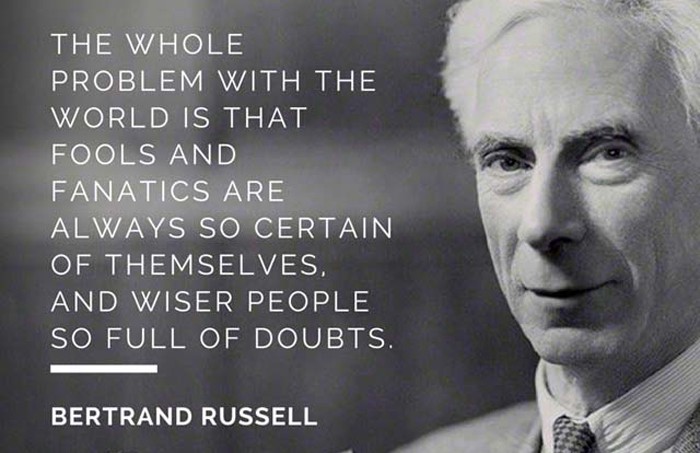Imagine A Great Debate
Picture yourself in an important strategic meeting. You’re surrounded by smart people, maybe they’re even smarter than you. Actually, they probably are, about certain things anyway, and that’s ok. There’s a problem to solve and decisions need to be made. The debate is spirited, opinions are expressed and the path forward still isn’t clear. There’s always an opportunity cost. You can’t “boil the ocean”, or be “all things to all people”.
You speak up, then you listen. Everyone in the room is receptive to new facts. Their opinions are strong, but there is flexibility in their thinking. They seem conscious of the limits of their own knowledge. They readily accept the notion that someone may have a better idea for moving forward. A decision is made. Is it the right one? No one is completely certain, but it’s the best choice given all the facts on the table. If it doesn’t work, you can learn and adapt.
This fictional meeting of the minds is made possible only if the people involved share the hallmarks of intellectual humility.
Defining intellectual humility
According to The Critical Thinking Community, intellectual humility is defined as…
a) Having a consciousness of the limits of one’s knowledge, including a sensitivity to circumstances in which one’s native egocentrism is likely to function self-deceptively; sensitivity to bias, prejudice and limitations of one’s viewpoint.
b) Intellectual humility depends on recognizing that one should not claim more than one actually knows. It does not imply spinelessness or submissiveness. It implies the lack of intellectual pretentiousness, boastfulness, or conceit, combined with insight into the logical foundations, or lack of such foundations, of one’s beliefs.
Intellectual Humility = Love of Learning
Possessing general humility may allow us to see our own errors and push us to learn new things, intellectual humility brings with it more pronounced characteristics, such as understanding our own intellectual limits, a desire to seek the truth and the ability to be self-critical, among others, all of which motivate us to learn in a deeper and more holistic way.
When we combine intellectual humility with grit and determination to learn and grow, we step in to a deeper place of understanding, cultivating the experience to make better decisions and add more value than ever. This constant drive to dig deeper and better understand our most important enterprises in life is essential to greatness in anything. Learning through experience and conscious and deliberate discovery has the power to push us beyond our current limitations. It will set the stage for a wiser tomorrow.
The Case for Valuing Intellectual Humility
The only true wisdom is in knowing you know nothing. Socrates
To embrace intellectual humility is to push back against the ego. That combination of fragile outer shell and unceasing inner voice that portends to protect us, but in reality keeps us from seeing things as they are. To truly see the obstacles, we must be able to recognize our own shortcomings and that starts by admitting to ourselves (and others) that we don’t have all the answers. This is the place where growth never ends, and it’s where we want to live if we never want to stop learning.
As we scale the ladder of mastery in any field, we’re progressively faced with more complex problems that require innovative solutions. It’s less black and white, and the stakes are always higher. The solutions are often nuanced and varied. Ultimately the path forward carries a degree of risk, in fact, it probably won’t work out how you had envisioned. It may be even better, or it could fail miserably. As the bar gets higher we need to be comfortable with our limits and seek the knowledge we need to choose the best path forward.
Interestingly, some of the most successful organizations in the world value the characteristics inherent to intellectual humility. They want people who are willing to take risks and fail, then learn and grow from those failures. To wit, Google…
Without humility, you are unable to learn,” says Laszlo Bock, VP of Hiring at Google. “Successful bright people rarely experience failure, and so they don’t learn how to learn from that failure.” Instead, he says, they commit the “fundamental attribution error,” which means attributing positive results to your own genius and negative results to someone else’s shortcomings (i.e., intellectual arrogance).
What we’ve seen is that the people who are the most successful here, who we want to hire, will have a fierce position. They’ll argue like hell. They’ll be zealots about their point of view. But then you say, ‘here’s a new fact,’ and they’ll go, ‘Oh, well, that changes things; you’re right.’
The opposite of intellectual humility, in essence, is intellectual hubris. In our knowledge-driven economy no one has time for the rigidity of over-embellished pride, calcified egos, the braggart or thin-skinned “expert” threatened by new facts or people who may know more. More than ever, there is little respect for those so invested in their own “expertise” to consider that they may just be wrong, that there may be a better path. This stifles the very creativity and spirit of discovery that leads to greatness.
Turning Intellectual Humility into Value
So, how do we cultivate intellectual humility and use it to create value?
- Acknowledge and honor your limitations
- Seek the truth
- Ask powerful questions
- Listen
- Embrace your inner student
- Internalize what you learn
- Teach
The more I live, the more I learn. The more I learn, the more I realize, the less I know. — Michel Legrand
Here’s a post from Lifehacker with 30 quotes to inspire all of us to never stop learning.
Originally published on Medium.

